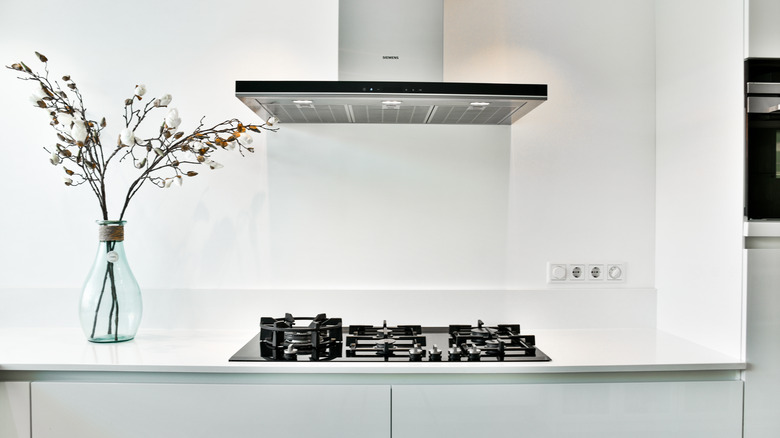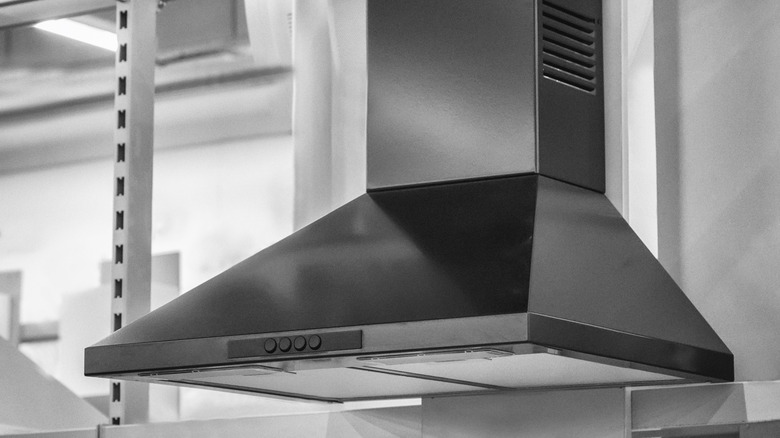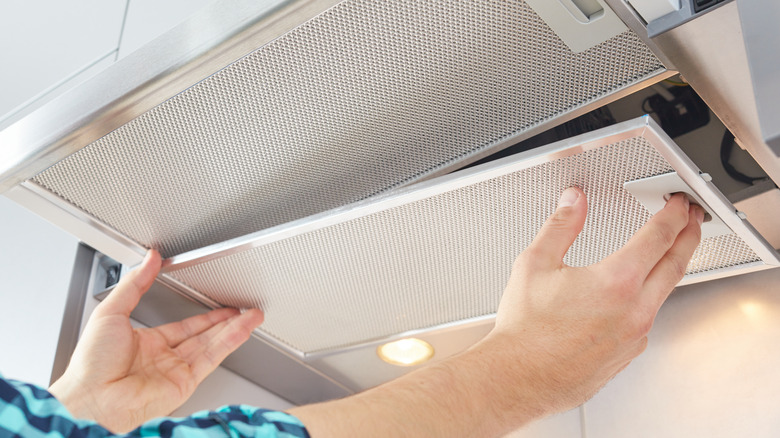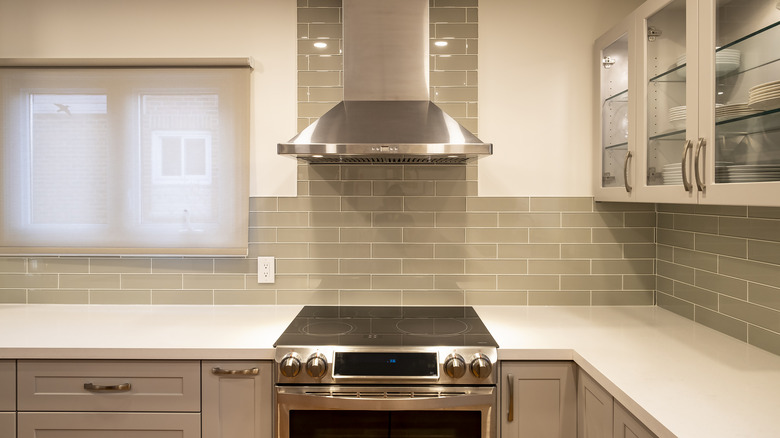Ducted Vs Ductless Range Hoods: Which Is Right For Your Kitchen?
Whether you cook regularly or every once in a while, you likely know how easy it is for kitchens to grow steamy and smelly while preparing food on a cooktop. As the meat, vegetables, and oils in your pot or pan chemically react to the burner underneath, an array of smoke, steam, and other elements infiltrate the once clean and filtered air of your home, the smell often lasting long after you've finished preparing your meal. According to range hood provider Hauslane, these residing particles can cause massive damage to your respiratory health if left to linger. Homeowners inhaling these fumes can contract asthma or lung cancer later in life due to prolonged exposure.
Investing in a range hood, however, can help solve this issue. A range hood is a large vent installed directly above your cooktop to collect the smoke and debris that rises from your stove while cooking. Hauslane states that these appliances are essential for those with underlying health conditions and a great buy for those wanting to prevent their kitchens from smelling like food hours after preparing a meal. Range hoods also make for a great investment long-term since removing the vapors and smoke that cause oil and grease buildup better protects the surfaces inside your kitchen. If you're considering adding a range hood to your kitchen, here's a breakdown of two popular variations to determine the best fit for your cooking needs.
What is a ducted range hood?
A ducted range hood connects to a vent placed outside a home via a duct inside a wall or ceiling. Ducted hoods provide a deeper clean than their ductless counterparts, says Compact Appliance, as this particular model removes steam and harmful contaminants entirely by transporting polluted air outdoors. Compact Appliance also states that these range hoods best serve homeowners who cook pretty often since these kitchens are more likely to endure grime buildup due to a lack of proper air circulation over time. Ducted hoods are also recommended for commercial spaces, like restaurants, where harmful fumes produced by cooking are continuously released for long periods.
Ducted hoods are also typically more expensive than their ductless counterparts. Ducted hoods not only cost more on average but are also more costly and challenging to place inside your home. These hoods need to be attached to a duct inside a wall or ceiling to function, which means some homeowners need to install these ducts beforehand. According to Proline Range Hoods, ducted range hoods almost always require a contractor for installation, which could be considered an extra expense and hassle for those fond of DIY projects and cutting costs.
What is a ductless range hood?
On the other hand, a ductless range hood does not connect to your home's exterior. Instead, the appliance absorbs the contaminated air and runs it through a filter inside the machine before releasing it back into your kitchen. A filter, usually made out of charcoal, can only clean the polluted air so much before unleashing it back into your home, so a ductless range hood isn't considered to clean your kitchen's air as thoroughly as a ducted hood. Also, Compact Alliance says ductless hoods usually don't remove steam from a kitchen the way ducted models do, so this range hood likely won't keep your kitchen from becoming humid while cooking.
On the bright side, ductless range hoods are much easier to install when compared to ducted hoods. Ductless models can be placed anywhere inside a kitchen, says Proline Range Hoods, since they don't require a connection to a duct. Those who opt to install a ductless hood still won't be exempt from extra fees since the filters inside ductless range hoods need to be replaced regularly to keep the appliance in pristine working condition. The longer and more frequently you use a ductless range hood, the quicker the hood's filter will grow clogged and dirty over time. Ductless range hoods are also more affordable than their alternative, so those on a budget may find this type of hood the best option.
Which model is right for you?
As you can see, ducted and ductless range hoods each have their own pros and cons. The type of range hood a homeowner should purchase depends on several factors, including their cooking habits, kitchen design, and budget. Proline Range Hoods also state that the type of home you live in can determine which range hood is best suited for your kitchen. Owners of single-family homes should consider purchasing a ducted hood. Although they usually cost more, they can prove to be a fantastic investment years later. However, those living in multi-family housing should opt for a ductless range hood since many complex owners or landlords would be against a tenant installing a duct system within their unit.
There are several other factors one should consider before choosing a range hood. Those who suffer from breathing problems, or are diagnosed with a respiratory disorder, should consider a ducted model since these range hoods typically offer a deeper clean than ductless models. Those who enjoy experimenting with different cuisines in the kitchen should also opt for a ducted model, according to Proline Range Hoods. Some foods release more toxins into the air than others, and ducted hoods ensure as many as possible are removed from your home. However, ductless range hoods might be best for those looking for a cheaper way to clear their home of odors and harmful particles with minimal hassle.



